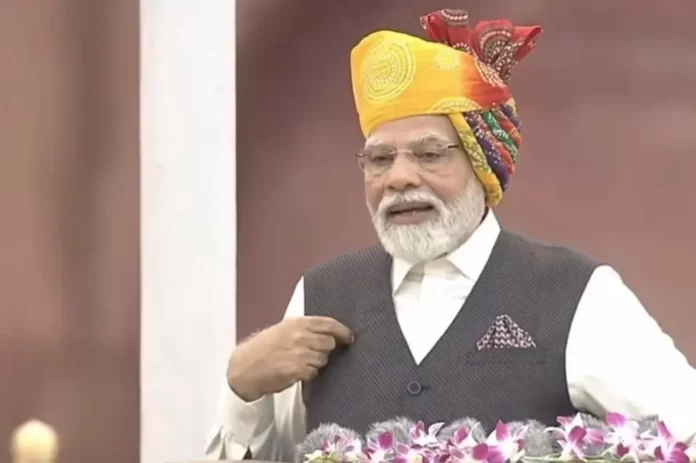On the 77th anniversary of India’s independence, Prime Minister Narendra Modi addressed the nation from the historic Red Fort in Delhi, highlighting a range of issues and concerns that hold significance for the country’s present and future. Amid the celebratory atmosphere of the occasion, PM Modi’s address was a blend of assurance, determination, and acknowledgment of both achievements and challenges.
One of the pivotal aspects of his speech was his emphasis on the state of Manipur, which has been grappling with waves of violence and unrest. In his address, PM Modi expressed the government’s unwavering commitment to restoring peace in Manipur. He reached out to the people of Manipur, assuring them that the entire nation stands in solidarity with them during these testing times. This assertion of support not only signifies the government’s commitment but also underscores the unity of the nation as a whole.
The prime minister’s acknowledgment of the turmoil in Manipur and his affirmation that a lasting solution could only be achieved through peace serves as a significant message. His words reflect a holistic approach to addressing conflict and underscore the importance of dialogue and understanding in resolving disputes. By acknowledging the violence and its aftermath, PM Modi not only recognized the pain and suffering endured by the people of Manipur but also signaled his commitment to restoring stability and harmony to the region.
Critically, PM Modi’s address came shortly after his government successfully thwarted a no-confidence vote in Parliament. The opposition had criticized the government’s response to the crisis in Manipur and demanded that the prime minister address the parliament on the issue of ethnic clashes. The timing of his Independence Day address, therefore, carried added weight, as it was an opportunity for him to directly communicate his stance on the matter to the nation.
The Manipur situation isn’t just an isolated issue; it serves as a microcosm of India’s ongoing challenges and efforts to ensure a harmonious society. PM Modi’s assertion that the state and federal governments are collectively working to maintain peace in Manipur emphasizes the importance of coordinated efforts to address complex challenges. It reflects the essence of federal governance and the necessity of partnership between the central and state authorities to achieve sustainable solutions.
Moving beyond Manipur, PM Modi’s address encompassed a diverse range of subjects. His reflection on India’s population growth and its implications highlighted the nation’s demographic strength. The prime minister’s emphasis on “demography, democracy, and diversity” as India’s pillars of strength encapsulates the essence of the nation’s identity and potential. By acknowledging these elements, he underscored the significance of youth and diversity in shaping India’s trajectory.
PM Modi’s declaration of India’s economy being the fifth-largest in the world and his promise to ascend to the top three in the next five years reflects his optimism and ambition for the nation. His projection that India will attain developed nation status by its centennial in 2047 further echoes his unwavering belief in India’s potential for growth and progress.
However, the prime minister’s assertions about the economy are not without scrutiny. His claims of successful inflation control and improved economic conditions post the Covid-19 pandemic face questioning, particularly in light of the challenges faced by India’s middle and lower classes due to rising essential prices. Official data revealing retail inflation at a 15-month high in July highlights the economic complexities that India is navigating.
PM Modi’s address also acknowledged the widespread natural calamities that have beset several states in recent times. The prime minister’s assurance that both state and federal governments are collaborating to aid affected individuals in rebuilding their lives reflects the government’s responsiveness and dedication to crisis management. It also underscores the need for a comprehensive disaster management strategy to mitigate the impact of natural disasters.
Prime Minister Narendra Modi’s Independence Day address encapsulated a wide spectrum of India’s realities, challenges, and aspirations. His focus on Manipur served as a poignant reminder of the nation’s collective responsibility to address internal conflicts and strive for unity. His reflections on demographic strength, economic growth, and disaster management highlighted India’s multifaceted journey. As the nation continues to navigate its path forward, PM Modi’s address stands as a guiding light, emphasizing the significance of unity, progress, and resilience in India’s quest for a brighter future.


